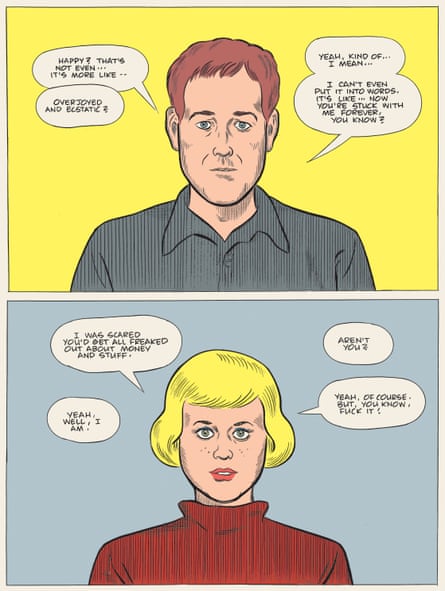Would you go anywhere near a book described on its back cover as “a cosmic timewarp deathtrip to the primordial infinite of everlasting love”? Yet, while it may have its tongue firmly in its cheek, the blurb is not an inaccurate precis of Daniel Clowes’s latest graphic novel.
The book opens in 2012, with its eponymous heroine discovering that she is pregnant. Patience, who thinks of herself as a “white-trash piece of shit”, has had a rough life, marked by abuse, neglect, poverty. Her relationship with Jack Barlow, the only man who has ever been nice to her, and the pregnancy, are her lifelines. Jack, too, thinks of their love as his salvation, but very soon inside this threshold of a new, better life, he comes home to find Patience dead, apparently killed by an intruder. His life goes into freefall: he is first accused of her murder but released after a year, whereupon he becomes obsessionally focused on finding out who killed Patience.
The second act, set in 2029, changes the game entirely: Jack, now a jittery, combustible monomaniac bent on revenge, discovers a man called Bernie, who may have invented a form of time-travel. He transports himself to 2006, his future self eavesdropping on Patience’s life before she met him, convinced that her convict ex, a thug called Adam, is her killer. The idea is to intervene in the inexorable flow of time and kill him so that he doesn’t exist by the time she meets Jack. Things go spectacularly wrong and Jack finds himself in 1985. And with each leap back, the reader will learn things about Patience’s past, and about Jack’s attempts, in the “present”, to refine the time-travelling, that will spin the story into wholly unexpected places.

At certain points, the narrative may remind you of the film Looper, at other times, of that old counterfactual question, “If you could go back in time and kill Hitler’s mother, would you do it?” There is no strand or element in the tight weave that is superfluous or casual, but particularly crucial to the story is Jack’s encounter in 1985 with a suave scientist, Wolfe, who he thinks can manufacture more of the “juice” that is essential to time travel. The final section, set in 2012 again, adds information to the first 2012 section in a way that can only be called cinematic. So much has been withheld from us, and so many new twists now happen, that you’ll have to take these pages in one sitting then reread instantly.
Clowes does realism impeccably – think of the pitch-perfect depiction of adolescent ennui in Ghost World, or the psychological and emotional truthfulness of Mister Wonderful – but he is also fond of letting the irruption of the hyperreal or fantastical not so much shift gears as change the entire vehicle. His most complex book, David Boring, places effortless forays into the surreal in the middle of what is essentially a psychosexual Hitchcockian narrative. In Patience, a love story like many of Clowes’s novels, the incursion of sci-fi is at first delightfully surprising and thereafter modulated so effortlessly that you see behind the irony of that self-consciously purple-prose blurb to the truth it encapsulates. Jack remains ambivalent throughout about whether he is seeking revenge or looking to make Patience’s life follow a different trajectory, this time a happier one; the cloudiness imbues the work with nuance and moral complexity. Patience, the virtue, is a simple function of time, and the ramifications of the book’s title – both the name of its heroine and the quality that most marks Jack, who waits out decades and bends and breaks time to do the one right thing in his life at unimaginable cost to himself – are devastating, especially when you reach the final pages.
I prefer the artwork of Ghost World, with its dominant pastel green, or, even better, the austerely beautiful black-white-and-grey chamber music of David Boring, to the occasionally eye-hurting full-colour extravaganza that is Patience, but this is a Clowes novel, constructed with rigorous narrative and visual intricacy, so you need to pay attention to every single panel. An example: that bearded man sounding off on the TV whom Jack and Patience watch nightly with horrified fascination might seem like a background detail, thrown in for verisimilitude, but you’ll discover his shattering consequences for the story towards the end. This is a deeply affecting book, and despite its gritty prose, colourful language and hardboiled trappings, a tender one, its sustained undertow of tenderness and melancholy giving it a surprising delicacy.

Comments (…)
Sign in or create your Guardian account to join the discussion